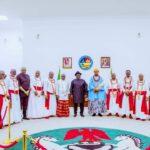“Often when you think you’re at the end of something, you’re at the beginning of something else”. Fred Rogers
Before my graduate studies abroad, I had attended the University of Lagos where I obtained my first degree, after what I still consider one of my greatest learning moments. In those days at UNILAG, as our alma mater is fondly called, there were limited opportunities, and I know many graduates of Nigerian universities are aware of this limitation. But as a post graduate student in the United States of America, I had boundless opportunities, both in the classroom and outside. I also met great teachers, writers and classmates who had considerable influence on me. As they say, “American education combines facts, figures, and data with an open-ended, problem-solving-based curriculum that involves collaboration, trial-and-error methodologies and risk taking”. For me, nothing would have been more telling.
Therefore, my American educational journey and experience were most moving and instructive, and it remains unforgettable for many reasons. And I must say that I enjoyed every bit of my stay in the US as a post graduate student and a scholar. That is also why American education is the envy of the world. So, it is usually not surprising or out of place when some parents and their children do everything humanly possible to acquire American education.
For those critical years in American universities, I sometimes, stood and gazed in wonderment, at my environment. I also marveled at the teachers and their grasp of their different courses, the excellent curriculum, the facilities, the outstanding academic programmes, the opportunities in almost every area, the excellent educational planning, the confidence of an average scholar and my fellow students. And every day, I prayed quietly, and wished also, to see a day when my country, Nigeria would become a bastion for learning and research, like the United States of America and other high-income countries. Even though my dream is yet to come true, I have remained hopeful for many reasons.
However, what lifted my spirits and excited me the most, was the culture of teaching and mentoring after retirement, a deeply entrenched tradition in many developed countries.
Unlike Nigeria, retirees in different areas of study are in very high demand in Europe, Canada, the United States of America and even the Caribbean, because of an average retiree’s skill and wealth of experience. They are highly sought-after because of the heavy “anointing” they carry as experts. As a matter of fact, the system recognizes the intellect of senior citizens, their long training, the unique experience at their disposal and the fact that many of them are walking libraries and encyclopedias. So, even without any long record of scholarly or academic work within institutions of higher learning, they can still become lecturers or fellows with financially rewarding positions in different faculties because of their skills, competencies, impressive research records, proven abilities and their special areas of interests as thoroughbred professionals.
Another interesting part of this story is that both undergraduate and graduate students’ benefit from the research and training of these senior fellows who are supported heavily with funds from outside the university community. The fact that these retired professionals can easily attract funding, even from unlikely quarters, make them assets and very important partners in the global struggle to make the world better through education and knowledge acquisition. In a country like Nigeria where funding remains a very knotty problem in our institutions of higher learning, bringing senior citizens on board, can also seriously address this issue of finance with their goodwill and wide network of friends.
So, it is common in those countries for a brilliant diplomat, lawyer, a financial expert in either the private or public sector, an experienced soldier, a media guru, a writer, a polyglot, a religious leader, a professional negotiator, an international technocrat or even a knowledgeable scientist to retire and return to the classroom for the good of the next generation. These senior citizens who come to lecture theatres with a large dose of patriotism, diverse experiences, skills, knowledge and empathy, leave students much better than they found them. It is not rocket science. This inspiring and commendable state of affairs worthy of emulation in American schools, is simply a product of deep thinking and planning.
For instance, how often do we bring our veterans and senior citizens on television to speak on important issues around development, stability, diplomacy, cooperation, social and economic rights of women and children, economic growth and political thought? Apart from Professor P.L.O Lumumber, the highly cerebral scholar from Kenya; Ambassador Joe Keshi, a retired diplomat and a few other active voices, who else comes on national television with a wealth of experience? Any one who watches international news channels can attest to the robust and brilliant views of senior citizens on television across the world.
Shortly before I left America after my doctoral degree, a classmate in my department reminded me of Nigeria’s enviable position in the past, long before our independence. He told me again and again, how our premier university, the University of Ibadan, once attended to the health needs of the royal family in Saudi Arabia. He also spoke eloquently about Nigeria’s educational system, and how our universities and research centres were the preferred destination for scholars and professionals all over the world. In addition, Nigerian universities attracted foreign students from Africa and beyond in those good old days. Those years were indeed, Nigeria’s golden age of excellent health services, education and good administration. It was actually a time in our history when we recorded the greatest achievements.
As I reflected on those days, I also used to ask myself: why can’t we reinvent ourselves, our institutions and our retirees in different professions? Is it impossible to return our senior citizens to our institutions of learning so they can instill values, mould young people, ignite their imagination and passion, teach our history, conduct lectures on integration, share experiences and bring about awareness, especially in this age when people no longer pay attention to history and traditional knowledge acquisition? Nothing would have been better at a time like this.
After a moment of thought recently, I told myself that we are indeed underutilizing, and even misapplying our great and God-given human resources and our living legends that are still around. How many of us have ever stopped to think about what we can achieve in a formal classroom with academic and practical instructors like General Olusegun Obasanjo, Chief Emeka Anyaoku, Bishop Mathew Hassan Kukah, Chief Philip Asiodu, Engineer Vincent Maduka, John Cardinal Onaiyekan, General Yakubu Gowon, Chief Folake Solanke, His Eminence, Muhammadu Sa’ad Abubakar, Igwe Nnaemeka Alfred Achebe, Oba Sikiru Adetona, General Abdulsalami Abubakar, Lt. Gen. Abdulrahman Dambazau, Captain Aliyu Babangida, Barrister Priscilla Kuye and many others. Or do we also think that because they are not professional teachers, they cannot prepare lesson notes, guide, teach and evaluate students?
The trajectory of the careers of these distinguished Nigerians is well-known, and also fitting for instruction in strategic and military studies, law, ethics, religious studies, patriotism, trade dispute, public administration, community development, diplomacy, conflict resolution, chieftaincy affairs, integration, peace studies, African history, broadcasting, engineering and values of professionalism.
No country can develop without her professionals, both old and young, in different fields of human endeavour.
And the older these experts are, the better for that country and her citizens.
When we shut out our elders because of their age, which should ordinarily be an advantage, we limit ourselves and
our potentials. We also unconsciously become stumbling blocks to the success and the better life that we all seek.
I have read interesting stories about countries that availed themselves of the services of their senior citizens, both in times of war and peace. So, we cannot afford to be different.
So, as we plan to become better as a country and an improved people, we must take the experience and capacity of our golden agers into consideration. Although a few people may disagree with the fact that with age, comes more wisdom and knowledge, but new studies have confirmed that adage about that time of life that is well-known for wisdom and experience. So, in whatever way, we must take everything we can from knowledgeable senior citizens around us before it is too late. After all, aging comes with continuous growth, and the realization of this, opens our eyes to the benefits accruable.
And it is never too late to start opening the doors of our tertiary institutions and other centres of learning to our elders and retirees who have something very important to offer.
Dr. Ochei, a Business Development Coach and Gender Advocate writes from Lagos.










